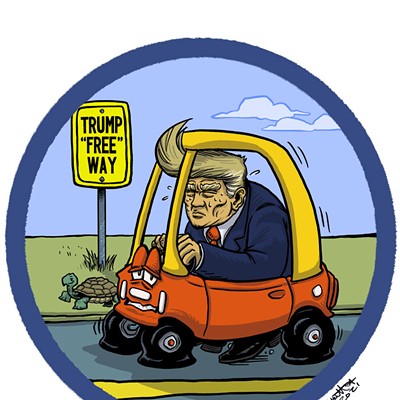Oklahoma Gazette provides an open forum for the discussion of all points of view in its Letters to the Editor section. The Gazette reserves the right to edit letters for length and clarity. Letters can be mailed, faxed, emailed to [email protected] or sent online at okgazette.com, but include a city of residence and contact number for verification.
Taking tests to task
Drug testing has only one real purpose: to ostracize those caught using drugs.
Just like workplace drug testing, if it really affects work performance, do you really need a drug test? Won’t you see its effect? Those who do cocaine, meth, etc. and time it right, you’ll never catch those people — do it Friday and Saturday, and it’s out of your system by Monday.
And a $20 drug test is laughable; it can’t be a very good test. Plus, there are all kinds of ways to beat a piss test. Florida and Kentucky went in the hole $5.4 million combined — a brilliant use of taxpayer money. In fact, a Florida federal judge ordered Florida to cease, as results didn’t justify the cost.
Twenty-nine out of 1,300 welfare applicants testing positive for drugs is laughable (News, Peter Wright, “Getting testy,” July 3, Oklahoma Gazette). State Sen. David Holt says that makes Temporary Assistance for Needy Families more successful.
Of course, he has to say results are in line with what he expected. Bullshit. He had no idea what the results would be. And they are puny at that, yet he can’t admit that, as it would make his testing bill look a terrible waste of taxpayer money. It could be better used funding education. Why don’t we also test all our legislators who are paid by our tax money?
—Phil Grove Tulsa
Mucking up markeplace fairness
Government has a habit of phrasing proposals in a way that sounds reasonable. A good example of this is the Marketplace Fairness Act (MFA), which is neither fair nor affordable, nor easily implementable.
The MFA would make Internet retailers unpaid tax collectors for almost 10,000 governmental entities. It sets an arbitrary threshold for small sellers doing $1 million or less in sales — not profits. Think about all of the momand-pop shops who sell online. These are the Internet entrepreneurs who have worked hard to provide a fair income for themselves and their family, and this threshold does not protect them.
My company would be one of those not protected. I employ between 15 and 20 people who work hard and enjoy working for a smaller, family-style company. They help create, and share in, the profits of a creative and nimble company that successfully plays by the rules and satisfies customers.
The pretext is that local retailers are being hurt because customers are buying products online instead of local retail shops, because they don’t have to pay sales taxes. Yet people buy online because it is more convenient, saves time and can be done without restrictions of time or location. Generally, products on the Internet can be easily compared for best price and availability, they can be bought with a click and they don’t require gas or time to travel.
If the MFA becomes law, I would immediately have to hire additional people just to keep up with the programming, tax collection and verification of paperwork, to ensure we don’t get threatened by a potential outof-state audit. Yet my company would be producing/selling no more as a result of this, and our expenses would significantly increase. The result would be less efficiency, higher expenses, possible layoffs and higher prices.
Simply stated, the MFA is a moneygrab by state governments in the pretext of making things fair, using inefficient retailers as their stooges. I strongly urge U.S. Rep. James Lankford to consider the damaging effects another needless tax will have on Internet-based companies and technology-era entrepreneurs.
—Hal Stevens Edmond
Terrific teachers
After reading the commentary by John Thompson in the July 17 Oklahoma Gazette on using student test scores for teacher evaluations (”Avoiding a fiasco in education”), it reminded me of an article I wrote several years ago on, “What is a master teacher?” I explained that a master teacher:
—Makes students his or her top priority; —Has the ability to stimulate students; —Consistently looks for and brings to the classroom current and stimulating material; —Works with students outside the classroom on projects that give students a practical application for the subject; —Keeps up with his or her field of expertise; —Has the ability to see individual differences in students; —Has the ability to get students to ask challenging questions; —Has enthusiasm for what he or she is teaching; —Really does care about his or her students, and —Has the ability to teach students how to think and problem-solve.
The problem(s) we face today is how we can find ways to make classroom teaching important once again in society. Until we find a way to recognize and reward great teachers and make it as vital in our society as coaching a championship sports team, we’re never going to solve our problems in education. We also have to do a better job of training our future teachers. Until our universities make training teachers a top priority, we’re never going to have enough master teachers.
Some say there is no real way to evaluate how effective teachers are in a classroom. I don’t agree. Having spent 35 years in the classroom at the high school, junior college, college and university levels, I can walk in a classroom and tell in a short period of time whether or not a teacher is a master teacher.
It is not the building or even the equipment — although both are important — that makes the educational system work. It is the master teacher.
—Ivan Holmes Oklahoma City
Holmes is a past regent and commissioner to the Education Commission of the States under former Gov. David Boren.
‘Tightening the noose’
I salute Kurt Hochenauer for his spot-on opinion in the July 24 Gazette, “No toke over the line.”
Basically other states have come to their senses about pot, both medical and recreational and the associated prison reform. Once again, Oklahoma is tightening the noose on its citizens.
When Oklahoma uses human incarceration as a major economic model, it is helpful to keep the private prisons and the legal system clogged with nonviolent drug offenders. It’s legalized extortion on the public sector.
Will every driver be tested or will selective enforcement of this drug law be used to harass any suspicious-looking person?
Texting and driving is far more dangerous than THC in the blood from a trip to Denver two weeks ago, where it is legal.
Once again, it is the taxpayers who get to pay to enforce this draconian drug law. Lockin’ em up costs taxpayers about $30,000 per year per prisoner.
The main factor that draws young professionals to Oklahoma is the giant purse called the oil and gas industry. It surely isn’t because Oklahoma is a progressive state in any other realm.
I would bet that Colorado and many other states are enjoying a huge economic boon thanks to same-sex marriage and marijuana reform, but it’s obvious they have no idea what the hell they are doing.
—Ron Ferrell Jones











